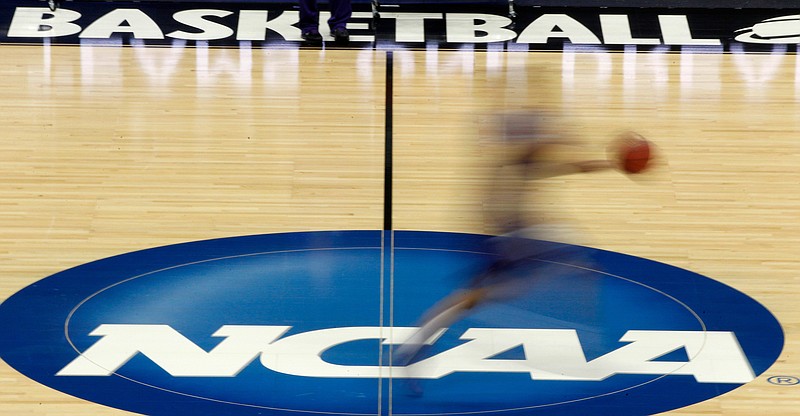You can't make this stuff up.
On Monday, a high school sophomore football player from Shreveport, Louisiana, named Decoldest Crawford gave a verbal commitment to spend his college years, beginning with the 2022 football season, at Louisiana State University.
On Tuesday, the NCAA Board of Governors voted unanimously to allow student-athletes to be paid for the use of their name, image and likeness once the NCAA's three divisions reach an agreement on the rules they wish to implement regarding such business opportunities.
All of which returns us to Crawford and his highly marketable first name. Can't you just see the billboards that could one day spring up along I-49 between Shreveport and Baton Rouge, beginning sometime in 2022?
The smiling face of Crawford would be looking down at you, his LSU purple-and-gold receiver-gloves-covered hands holding soft drinks covered in icicles, a giant quote bubble containing the message: "For 'Decoldest' beverages around, catch the savings at your nearest Bayou Bengals Beverage Barn! They're the Bomb!"
What could possibly go wrong with this scenario?
What couldn't?
Nothing like giving a bunch of overzealous boosters (oops, savvy businessmen) a legal loophole to pay their college football and men's basketball heroes whatever they choose.
Because that's really what this NCAA capitulation is all about. The third catcher on the baseball team isn't going to reap a dime from this. Nor the No. 5 women's tennis player. Not to mention members of either the men's or women's cross country team. Those folks are going to have to make do with whatever financial-aid money comes their way through the creative budgetary minds of their coaches.
One-third scholarship here. A half-ride there. Books and in-season training-table meals for a few more.
Ah, but for the guys whose names and faces already are familiar to the masses, it's a payday in a big way.
Maybe.
The devil will be in the details, and the NCAA's details can be confusing at best. Will only certain businesses be sanctioned to pay these players? Will they have to be in school for a certain number of years before receiving this money? Will it be paid to them while still in school or after their eligibility is up? Will it be capped?
And at what point do the NCAA police declare rules were violated and probations are forthcoming? Would the players have to return the money if their schools are found guilty? Would the Feds step in? Aren't we pretty much at the point of no return when it comes to the ridiculously outdated notion of a level playing field?
"We must embrace change to provide the best possible experience for college athletes," said Michael Drake, chair of the board for the NCAA, which governs major college athletics.
At the risk of sounding cynical, all this really changes is payments to the game's collegiate superstars moving from under the table to over it. The recent FBI investigation into college hoops brought to bright light what has taken place in dark corners for at least 50 years. Money, big money, changing hands to let Johnny Jump Shot or Willie Wideout spend as little time as is required to be a faux college student for Big State U.
Yes, some of those phenoms have been worth the money. Some of them have been bargains of the highest order. If Auburn really did fork over somewhere in the neighborhood of $200,000 to top Mississippi State's alleged offer of $180,000 for 2010 Heisman Trophy winner Cam Newton - though the NCAA never proved any of that took place - it was money very well spent.
On the other hand, if Louisville through Adidas paid basketball player Brian Bowen $100,000 to never play a minute there, well, wonder if the IRS allows a tax write-off for that?
There's also this, as pointed out by ESPN radio personality Will Cain: Texas, Auburn and LSU have each already appeared twice in the five most-watched college football games this season. The rich get richer. Which means their ability to lure the best players gets easier. The haves are about to much further dwarf the have-nots.
But maybe this is still better. Theoretically on the up-and-up. The masses may even reap some tax revenue from this if U.S. Senator Richard Burr, a North Carolina Republican, gets his way.
"If college athletes are going to make money off their likenesses while in school, their scholarships should be treated like income," Burr tweeted Tuesday. "I'll be introducing legislation that subjects scholarships given to athletes who choose to 'cash in' to income taxes."
The Board of Governors has given the NCAA's three divisions until January of 2021 to finalize their guidelines. A lot of stores specializing in tailgating refreshments throughout Louisiana are no doubt already lining up to corral the marketing services of Decoldest Crawford.
Until then, these words from NCAA president Mark Emmert regarding this issue could have been spoken 50 years ago and been every bit as timely and true as today: "Structuring a model for allowing students to monetize a name, image and likeness while maintaining some recruiting balance is one of the biggest and hardest issues that everyone's dealing with."
He might as well label it Mission Impossible.
Contact Mark Wiedmer at mwiedmer@timesfreepress.com.
